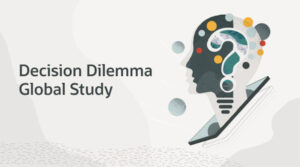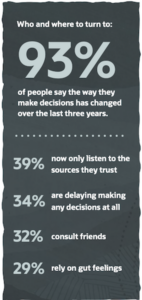Access to more information does not necessarily lead to better decision making, according to a new study from Oracle. Though 83% of those surveyed agree that access to more data should make decisions easier, 86% said that in reality, more data has led to less confidence in their decision making.
It seems that with more data comes more decisions, as well. The study found that 78% reported they are bombarded with more data from more sources than ever before, and 74% say the number of decisions they make every day has increased 10x over the past three years. As a result, 86% of respondents admit that this data overload is causing the decision making in their personal and professional lives to be much more complicated. About 59% admitted facing a decision dilemma daily, while 35% struggled to trust data sources.
In the business world, the decision fatigue dilemma impacts the risk tolerance of CEOs and investors, causing ripple effects throughout the economy, and poses challenges for businesses across all departments in areas such as budgeting, hiring, customer service, and partnerships. This decision making paradox has led to organizational inertia, the study claims. Business leaders recognize the importance of data for their organizations’ success, yet they lack faith in the available tools, undermining their confidence and hindering their capacity to make prompt decisions. While 97% want data to help them make better decisions, 72% admit that the volume of data and lack of trust have paralyzed their decision-making. In turn, 89% believe that the growing number of data sources has limited their organizations’ success.
 On the data management side, 40% of respondents say managing the additional data sources has required additional data collection resources, and 36% and 26% report slower strategic decision making and more opportunities for errors, respectively. Business leaders are skeptical of the current data analytics approach and report they do not believe it is addressing these challenges, as 77% report that dashboards and charts do not always directly relate to the decisions they need to make, and 72% believe most of their available data is only helpful for IT professionals or data scientists.
On the data management side, 40% of respondents say managing the additional data sources has required additional data collection resources, and 36% and 26% report slower strategic decision making and more opportunities for errors, respectively. Business leaders are skeptical of the current data analytics approach and report they do not believe it is addressing these challenges, as 77% report that dashboards and charts do not always directly relate to the decisions they need to make, and 72% believe most of their available data is only helpful for IT professionals or data scientists.
“The message is overwhelmingly clear—our current approach to managing and analyzing data must change. Especially in the business world. The benefits of getting it right span from attracting talent in a difficult job market, to gaining new investors in a tough economic climate,” the report states.
The study was conducted by Oracle along with data scientist Seth Stephens-Davidowitz, author of “Everybody Lies” and “Don’t Trust Your Gut.” The study surveyed over 14,000 employees and business leaders from 17 countries.
“People are drowning in data,” says Stephens-Davidowitz. “This study highlights how the overwhelming amount of inputs a person gets in their average day—internet searches, news alerts, unsolicited comments from friends—frequently add up to more information than the brain is configured to handle. People are tempted to throw out the confusing, and sometimes conflicting, data and just do what feels right.”
However, this can be a big mistake, warns Stephens-Davidowitz: “It has been proven over and over again that our instincts can lead us astray and the best decision-making is done with a proper understanding of the relevant data. Finding a way to get a handle on the stream of data at their fingertips, to help businesses distinguish between the signal and the noise, is a crucial first step.”
The study concludes that data needs to be more relevant to the decisions people make, or they will continue to struggle with decision-making. Business leaders and employees recognize the importance of data-driven decisions but require better tools and resources to effectively utilize it. Oracle says that to eliminate decision fatigue, enterprises should adopt innovative strategies to managing and analyzing data that enable their workforce to understand how decisions are made, evaluated, and managed.
“As businesses expand to serve new customers in new ways, the number of data inputs they need to get the full picture expands too. Business leaders that make critical decisions about how to manage their companies ignore that data at their own risk,” said T.K. Anand, executive vice president, Oracle Analytics. “The hesitancy, distrust, and lack of understanding of data shown by this study indicates that many people and organizations need to rethink their approach to data and decision making. What people really need is to be able to connect data to insight to decision to action. With our span of connected cloud capabilities, ranging from foundational data management, to augmented and applied analytics, to our suite of operational applications, we are uniquely positioned to meet this need.”
Related Items:
We’re Leaving Data Potential on the Table, Salesforce Says
Data Quality Study Reveals Business Impacts of Bad Data
5 Steps to Data-Based Decisions
The post Oracle Study Reveals Decision Making Paradox: More Data, Greater Uncertainty appeared first on Datanami.




0 Commentaires